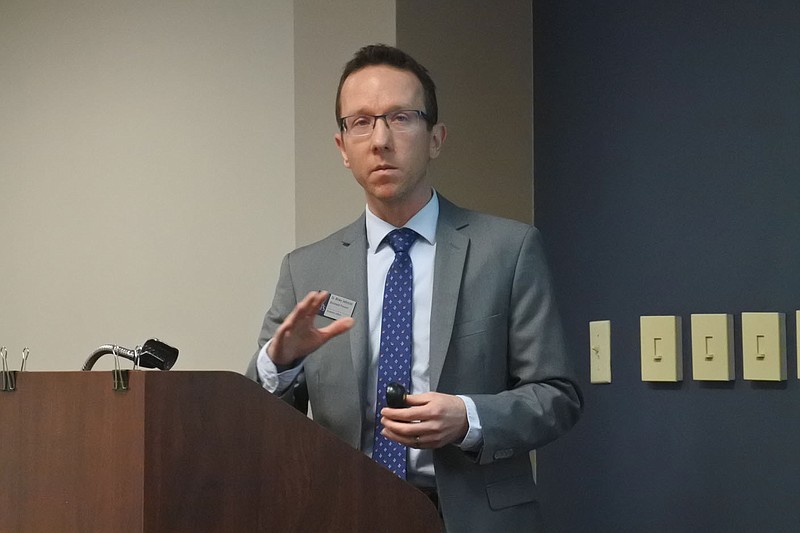FORT SMITH -- The University of Arkansas-Fort Smith is working to improve retention and success for students.
Blake Johnson, the university's new assistant provost of student success and retention, briefed the institution's Board of Visitors on his approach at a meeting Wednesday.
Johnson was named to his position in September after a national search, according to a university news release from September. He began the job Oct. 18.
The Office of Student Success and Retention was created through a reorganization of the university Chancellor Terisa Riley announced in April. The university also reduced its colleges from five to three, among other things.
Johnson is tasked to provide leadership and oversight in developing, coordinating and monitoring retention and student success initiatives with other university stakeholders to increase year-to-year retention and graduation rates, according to the news release. He leads the operations of the university's academic advising, TRIO programs, Americans with Disabilities Act accommodations, Academic Success Center, and Career Services as well while reporting to Georgia Hale, provost and vice chancellor for academic affairs.
Hale said Wednesday while the institution had student success happening in multiple areas before this, it wasn't a coordinated effort. The university expressed a desire to retain students and have them be successful while they are there to ensure they can succeed after they graduate.
Johnson defined retention as the continuous process of creating and maintaining strategies for meeting students' personal, academic, social and financial needs. He described it as a large holistic process in which everyone at an institution has a role.
Johnson said he tries to approach matters from an "outcomes first perspective." This means he doesn't want the university to keep something solely because it likes that thing or it worked well in the past. He prioritizes equitable outcomes for the university's retention efforts over judging their success based on the intentions behind them or their frequency.
Johnson provided a document outlining 13 areas of practice to improve student retention and success. The first is a conceptual model defining four factors, or barriers, that nearly every student must address to justify continuing their education.
These four barriers include the financial cost of higher education, a student's sense of being ready and empowered to learn, a student's sense of belonging at a particular institution and career applicability, or the long-term value and relevance students feel from the effort they put in.
However, Johnson acknowledged many other factors could influence a student's decision to stay at an institution, such as mental health, parental involvement and disability support.
"Discussions of this framework should lead to a detailed review of current institutional priorities, values/mission, program reviews and research/advocacy," Johnson wrote in his document. "Goal is to assess the 'load factor' of different barriers in relation to strategic outcomes."
Johnson said after the meeting the covid-19 pandemic affected the university's fall-to-fall retention for entering full-time students. The institution's retention rate was 72% from fall 2019 to fall 2020; that figure fell to 66.8% from fall 2020 to this fall.
Still, the university has reason to be optimistic, he said.
"There is a new wave of energy to get students involved and better connected to campus resources and it appears as though 2022 is going to bring back a more immersive student experience," Johnson said. "Looking ahead to fall 2022, our application numbers are up. Applications for first-time students are up 18% over last year and admits are up 27%."
Areas of Practice
Blake Johnson’s 13 areas of practice to improve outcomes for student retention and success at the University of Arkansas-Fort Smith include :
• Conceptual framework
• Success committees/strategic planning groups/advisory board
• Technology and data systems
• Research
• Progress and competency mapping
• Resourcing/communication for students and parents/families
• Resourcing/communication/training for faculty/staff
• Early alert systems
• Completion coaches/success coaches/peer mentors
• Matriculation, onboarding and first-year experience
• Career services integration
• Intentional and customized supports
• Consulting and external sources
Source: University of Arkansas-Fort Smith
